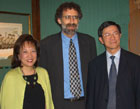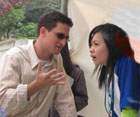|

2005
World Children's Choir Festival
The
Federation is helping to recruit and train volunteers for
the World Children's Choir Festival in Hong
Kong in July. The festival is sponsored by the Leisure
and Cultural Services Department and co-presented
by the Federation, the Hong Kong Treble Choirs' Association
with
the International Federation for Choral Music and the Music
Education Professional
Committee of the China Society of Education. Volunteers will
help in a series of activities during the festival, making
the most of this valuable opportunity to broaden their horizons
by receiving guests and participating groups from various overseas
countries. The festival is intended to improve choral professionalism
among participants and provide them with a taste of the special
features of song in Chinese and Western culture. On 12 July,
the Federation will co-present the HKFYG Grand Songbridge Gala
Concert as a festival highlight. The Songbridge concept brings
together leading choral artistry of stellar choirs and prominent
international composers to promote peace and understanding
in a co-operative and non-competitive atmosphere. This year,
the Songbridge choirs will live, work and play together in
Hong Kong, presenting a programme representative of their own
culture as well as folk music from other cultures. Check this
out for more information of the Festival:
www.hktreblechoir.com
|
 |
|
Thanks
to all donors-in-kind for Charity Premiere support
700
guests at the Convention and Exhibition Center watched
the Federation-hosted premiere of the long-awaited
'Star Wars Episode III Revenge of the Sith' on 17 May.
We are proud to say that the premiere was a great success
which enjoyed encouraging feedback from the public. We
would like to thank our corporate sponsors who supported
us through donations in-kind, namely零食物語, Kellogg's,
Baleno, Pak Fah Yeow International
Ltd, Canon and Toys"R"Us.
Click
here to see photos of the event:
www.u21.org.hk/main/photo/517/index.htm
|
 |
|

Hong
Kong Reading Month 2005
The
Federation, Hong Kong Publishing Federation Ltd,
the Leisure and Cultural Services Department, Hong
Kong Education City, Radio Television Hong Kong and the
Chinese University of Hong Kong are joint organizers of
the 2005 Hong Kong Reading Month from 23 April to 31 July
2005. Fok Ying Tung Foundation Ltd, Qin Jia Yuan
Media Services Company Ltd and Jiaduobao
Holdings Ltd are sponsoring
the extensive activities which include book exhibitions,
seminars, reading and sharing sessions and a student reading
enhancement scheme. All of these are designed to cultivate
the habit of reading, giving everyone the chance to enjoy
its pleasures and broaden their horizons. As the Chinese
saying goes, ‘A book holds a house of gold’ (書中自有黃金屋).
Check out the activities at
www.hkreadingcity.net
|
 |

Youth
Video Competition
Between
May and September 2005, the Federation, the Hong
Kong Arts Centre's Art School and YTV@RTHK are
jointly organizing a Youth Video Competition. The Competition
is
sponsored by Convoy Financial Group, East Asia Professional,
Senico-Masslink Technology Ltd and Suncolor
Printing Company Ltd. Participation is open to all
young people aged under 30 and individual entries are invited
in the secondary school
and open divisions. Competitors will direct and shoot a 5-minute
DV video clip, using their creative and artistic talents
to voice their opinions on issues that concern them. Three
workshops were held between 14 and 15 May 2005 at the Hong
Kong Arts Centre, when 50 young people learned how to make
DV clips. Young people’s opinions should get the respect
they deserve and we hope the Competition provides an effective
channel. Winning entries will be shown at the Federation's
Youth S.P.O.Ts and at the Hong Kong Arts Centre. Click here
to learn more
www.u21.org.hk/new_u21/c_time1/ya.htm
|
 |
|
| |
| |
|
 |

Come
Create - GO LEAD: a new world of hands-on creative technology
learning
this weekend Saturday 28 May at Cyberport
Seminar: 9:30 am
Guest of Honour The Hon John Tsang, JP (Secretary for Commerce,
Industry & Technology)
Showcase 11:30 am
Guest of Honour The Hon. Professor Arthur Li, GBS, JP (Secretary
for Education & Manpower)
Seminar speakers
Prof Mitchel Resnick (MIT Media Laboratory)
Mr Francis Ho (Permanent Secretary for Commerce, Industry & Technology)
Mr Taku Tamara (CSK Corp. Japan)
For more info: contact the LEAD Secretariat www.u21.org.hk/lead email lead@hkfyg.org.hk


The heart of giving
A caring community has cooperation, sympathy and generosity as its foundation.
So much can be achieved this way and the trend in social services today
is to build strategic partnerships that strengthen and support such co-operative
spirit. This is the very heart of giving and we at the Federation are
very grateful for the help and support we receive from our donors.
|

from
left to right: Dr. Rosanna Wong, Prof Mitchel Resnick (MIT Media
Laboratory) and Mr Anthony Wong
 
|
Last
week's Charity Premiere of the latest episode of Star Wars was
a good example. The event was so well received, with many donations
from private individuals and the generous sponsorship of The
Bank of East Asia and other corporate donors. Hong Kong is a
unique place, with its tightly packed, responsive business sector
and socially aware philanthropic community. Thank you to all
who have helped.
"The
youth of Hong Kong represent our future. The Hong Kong Federation
of Youth Groups plays a key role in guiding our young people,
and we at The Bank of East Asia are pleased to support the
HKFYG in its mission. Events such as this show what we can
accomplish by working together for the good of our community."
Mr. Joseph Pang Yuk-wing, JP
Executive Director & Deputy Chief Executive of The Bank of East Asia,
Ltd

 |
700
volunteers needed
HKFYG's Youth Volunteer Network (YVN) seeks 700 volunteers
June to August for:
Jockey Club summer programmes
World Children's Choir Festival
88th Lion Club International Convention
Contact 2169 0032 or visit www.u21.org.hk/yvn
|
Hong
Kong Young Ambassador Scheme 2005
Joint organizers: Tourism Commission & HKFYG
Eligibility: students 16+
Training: intensive programme
16 July - 5 August 2005
Application deadline: 10 June 2005
Click here for further information: www.yas.org.hk or tel 2561 6149 |

|

Youthline:
first resort for teens
Youthline handles calls from anyone aged 6-35 and has a team of professionally
trained counsellors who are always ready to lend a sympathetic ear. In May and
August, extra volunteers back up the professionals, because of the many more
anxious students who call to talk about exams. We asked Siu Man, who has been
in charge of the hotline since 1997, how the service works and how it has grown
since the early 90s.
"The
big difference about this service is that a telephone hotline
is
easy to use,
convenient and - above all it's anonymous."
|


|
Anonymity can be very important to
an upset, worried or depressed young person who just wants somebody
to talk to. It means there are none of the strings that are attached
to more formal, conventional counselling.
“It's
hard enough sometimes just to admit that you think you've
got a problem.
The chance to avoid a face to face encounter with an authority
figure like your teacher or parent will make it much more "user
friendly,"Siu Man said.
“In fact, the mobile
phone makes it even easier to call us. Teenagers no longer have
to wait till their parents have gone to bed before
they call. They can just step outside into the corridor and call
us on their mobile and be quite private. Privacy matters a lot.”
We looked at
the hotline statistics which show an undeniable increase in callers.
For example, there were 40% more callers to Form 5 Broadband
during the spring this year than there were at that period in 2001.
The causes are a surge in anxiety about academic success or failure,
linked more recently to worries about changes in the syllabus.
Over 30% of all callers to Youthline have problems at school including
pressure of work, peer-relationships and inadequate study skills
- but the predominant reason is exams.
“It's impossible
to be sure whether the increase in calls can be attributed to
an increase
in troubled teenagers because we now reach
a much wider target group. We have been promoting the service and
the Internet has had a great impact. We also help young people via
ICQ, chatroom counselling and email. But the Form 5 Broadband service
that deals specifically with exam-related stress has seen a phenomenal
growth.”
Overall figures
for Youthline are up by 20%, from about 40,000 in 2000-2001 to
almost 50,000 in 2004-2005. How do counsellors deal with all these
calls?
“First and
foremost we listen. We can do nothing if we don't understand
the problem.
Once we know why the person called we can give reassurance
and try to make sure that the person feels less isolated. If that
doesn't seem to resolve the matter we do follow-up with colleagues
and other agencies.”
Often the callers
just want someone to talk to. They are lonely or bored. The number
of
primary school children calling the hotline
has quadrupled since 2003, possible a symptom of the double wage-earning
family where both parents work long hours and the only company the
child finds at home is a helper or a sibling who can't do enough
to provide for their emotional needs.
“About 30%
of our callers are repeats -we are always pleased when they call
back because
it shows we have helped build up confidence
and they have learned to trust us.”
Telephone counselling techniques are quite different from others
and special skills are involved in building up this kind of relationship.
How can they be shared with new staff?
“We are writing
a manual. It contains advice and tips that we have acquired through
experience.
It will help our volunteer hotline workers
to acquire the necessary skills and follow the rules of best practice,
especially when we have limited time and scope to train extra numbers
for the critical peak periods.”
…and given recent trends it
looks as if more trained staff will be very useful indeed.
links:
F5 Broadband www.u21.org.hk/27771112
tel 27771112
Youthline www.youthlinehk.net/hkcee
tel 2777889
|
 |

Class-size:
the big debate
Pressure from teachers
and parents to reduce class sizes prompted the Education & Manpower
Bureau to run a pilot project this year in 37 primary schools
where some classes have been reduced
to 25. Data has not yet been analysed but due to the decline in
the birth rate, 18% of all classes at Primary One level are already
under 25 and 41% are under 30. At secondary schools the average
class size is currently 38. What is the best number and do numbers
actually make any difference?
|

|
At
a University of Hong Kong conference* on learning effectiveness
and class size last week, the consensus of overseas opinion
tended to back up the government’s reluctance to change although
not exclusively for economic reasons. Views of academics from
the UK and US varied and much research has focused on reducing
class size not just to 25 but to less than 20. However, the
effects on literacy of small class size at pre-school and early
primary levels has received more widespread acceptance. What
most experts agreed on was that change in class size makes
little impact on the quality of education unless teaching methods
also change, with flexibility as a vital factor. As one of
the speakers said:
“A bad teacher in a small class is still a bad teacher.”
(Prof E Hanushek, Hoover Institution, Stanford University)
*Conference
papers are to be found at www.hku.edu.hk/education |
Plagiarism
by Hong Kong university students is on the rise
In August 2004,
two Postgraduate Certificate in Law (PCLL) students at the University
of Hong Kong were expelled for plagiarism*. The
incident sparked a heated debate on whether plagiarism is a common
phenomenon at Hong Kong universities. 33 cases of plagiarism were
reported by the HKSAR Government in the 2001-02 academic year in
the nine tertiary institutions and the figure doubled to 66 in
2003-04. During the current academic year, up to April 2005, 22
cases were reported.**
|

|
Plagiarism
usually involves copying or using others' work without proper
acknowledgement and is considered
serious misconduct and an infringement of academic integrity. It
is not uncommon anywhere in the world. The two main reasons given
by students is pressure of work and the ease with which copying
can be done.*** Punishment for plagiarism in the UK varies from
a lower grade for the course concerned, a demerit on the student’s
record, suspension of study or expulsion.
Education and
warnings about infringement of copyright are essential to improve
the
situation both in Hong Kong and abroad. In the UK,
the Plagiarism Advisory Service's 2004 survey revealed that 25%
of university students cheated by copying material from the Internet
although most were never caught. This is due to change since new
software is now available which is specifically designed to hunt
for and identify chunks of material downloaded and reproduced wholesale
from the Internet. Watch out you cheats.
* Hong
Kong Economic Times on 5 May 2005
** HKSAR
Government Press Release on 4 May 2005.
*** Retrieved
from http://news.bbc.co.uk/2/hi/uk_news/education/3852869
|
Practice
your English for confidence
The newspapers
are always full of discussion about the standard of English
in Hong Kong although consensus over whether
more people overall speak it adequately now than they did
in the past will probably never be reached. While there are
certainly more people who use the language adequately for
communication purposes than there were 20 years ago, academic
standards are harder to judge across the board. However,
if there has been a fall in standards it has been accompanied
by a natural drop in confidence, according to a large-scale
survey conducted by the Wall Street Institute of English
– an English language teaching company.*
|

|
The
survey was conducted online with 16,000 young people on
the Mainland and in Hong Kong,
Japan, Taiwan, South Korea, Singapore and Thailand. On
the confidence rating Hong Kong lags the Mainland already
with only 19% of respondents feeling comfortable speaking
English where 60% of the Singaporeans do. This is like comparing
apples and oranges because nearly half of Singapore's Chinese
population use English as their first language at home.
One way
of improving confidence is to increase the level of interaction
that
takes place in Hong Kong with native
English speakers. 21.3% of young Honkongers said they took
every opportunity to interact with mother-tongue English
speakers, compared to 23% on the Mainland. Confidence levels
could rise dramatically if they spent more leisure time together
- maybe at events specially organized for the purpose by
schools and other youth organizations. Another idea is by
dating – the time-honoured way of learning a language.
*reported in the South China Morning Post,
6 May 2005
|
|

|

